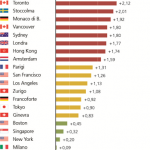Many people believe a low-cost Libor mortgage is the right choice of home financing at present. Why they could be wrong.
Successful home financing has to be affordable over the long term.
When the central banks rapidly lowered interest rates in response to the financial crisis, economists forecast that they could soon start rising again. But the opposite happened. The European economy now relies on “cheap money”, i.e. low interest rates. That’s why mortgage rates have also remained at a very low level in the past few years relative to the long-term average. And hardly anyone is now willing to predict when the interest situation could return to normal.
What is the “right” time?
So, is it worth switching fully to a low-cost, variable-rate Libor mortgage? Alfred Ledermann, Head of Mortgage Product Management, draws our attention to aspects that often get forgotten: “It’s true that there are no signs of a sudden interest hike at present. But when rates do eventually rise, the interest on fixed-rate mortgages will go up sooner than that on Libor mortgages.”
That’s why it can be very difficult to identify the right time window for switching from a Libor to a fixed-rate mortgage. And the financial markets never fail to throw up surprises. Viewed historically, interest rates have always returned to their average level so far. Ledermann: “When it comes to home financing, it’s never advisable to only consider a fair weather scenario.”
The right mortgage mix
The interest rates on fixed-rate mortgages remain highly attractive. This means it is possible to insure yourself against an interest hike at a reasonable cost. It can therefore make sense to choose a combination of Libor and fixed-rate mortgages. “A Libor mortgage lets you benefit from the record-low interest rates. At the same time, also having a fixed-rate mortgage in the mix affords you partial protection from a sudden rate rise,” advises Ledermann.
Ultimately, which mortgage mix is right for you depends on what kind of person you are rather than how much money you have in your wallet. How are interest rates expected to develop? How do you handle risk? You should only rely fully on a Libor mortgage if you are actually prepared to dig a lot deeper into your pockets when interest rates do eventually rise.
Questions you should ask yourself
Experience has shown it can be helpful to discuss the financing combination with an expert. However, only you can answer the key questions.
- Amount. How much financing do you need?
- Lifestyle. How much money do you want to spend on your home – in good times and in bad.
- Period. Until when do you want to plan the affordability of your financing?
- Income. How is your income developing?
- Interest expectations. When do you expect to see interest rates rise?
- Risk type. What is your attitude to risk?
by 21 Jul 2016





